ASX posts another solid gain, Bitcoin hits new record
ASX closes near 12-month high as BHP rallies; New blow to Fortescue leadership; Bitcoin testing $US50,000 as it hits new record high.
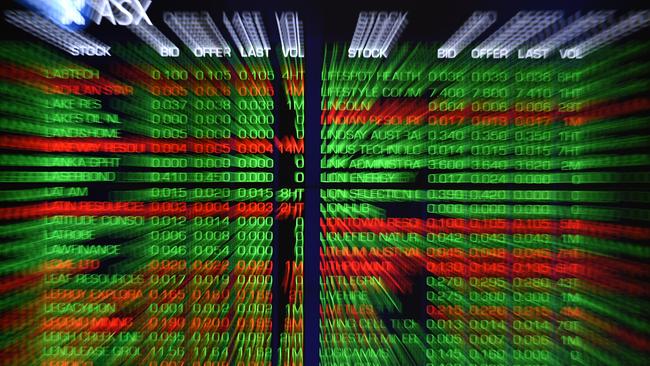
- Adairs in JobKeeper, dividend double
- NAB boost from soured loans plunge
- BHP cash splash with record interim dividend
- Ansell surges to record sales, earnings
Welcome to the Trading Day blog for Tuesday, February 16. Australian hit their best close in almost 12 months with BHP and other miners rallying. Fortescue leadership changes came after Iron Bridge project blowout. World markets extended gains overnight, while Wall Street was closed for Presidents Day. Earnings season continues. Results are from BHP, Ansell, Breville, Sims, Domain Group, Brambles and GWA, among others. The RBA released the minutes of its February board meeting.
7.40pm: Glencore hit by massive write-offs
Anglo-Swiss mining giant Glencore said on Tuesday it plunged deeper into the red last year, hit by the “extraordinary” challenge of Covid-19 and massive write-offs, especially on a mine closure in Zambia.
The company said it had a 2020 net loss of $1.9 billion after writing off assets worth $5.9 billion, compared with a 2019 net loss of $404 million following writedowns costing $2.4 billion.
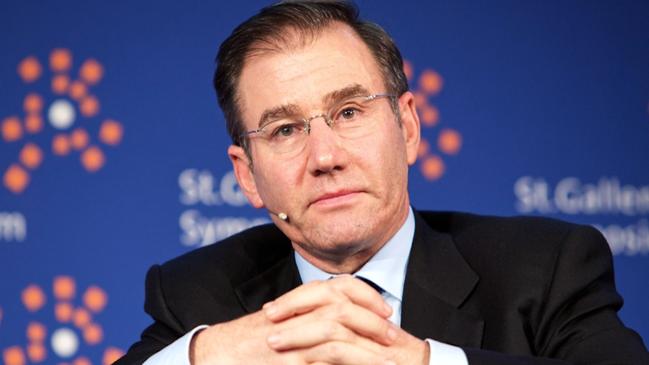
Sales tumbled 34 percent to $142 billion, it added.
The coronavirus pandemic and the impact on the global economy amounted to an “extraordinary” challenge for the company which mines and trades basic raw materials globally.
Glencore boss Ivan Glasenberg said in a statement the global economy was in recession in the first half of 2020, followed by a strong rebound in the second half.
The trading arm of the company saw operating profit soar 41 percent to $3.3 billion, reflecting the huge volatility of metal and oil prices.
However, the mining arm reported an operating profit fall of 13 percent to $7.8 billion, it said.
AFP
5.50pm: Tokyo closes higher
Tokyo stocks closed higher on Tuesday as investors kept a bullish outlook with Japan preparing to start coronavirus vaccinations, fuelling hopes for economic normalisation.
The benchmark Nikkei 225 index gained 1.28 percent, or 383.60 points, to end at 30,467.75, while the broader Topix index advanced 0.57 percent, or 11.14 points, to 1,965.08.
The Nikkei on Monday had closed above 30,000 for the first time since 1990. “There are some concerns on the upward trend, but (Tokyo shares) are likely to go higher as details about vaccination are revealed,” Rikiya Takebe, senior strategist at Okasan Online Securities.
AFP
4.45pm: Best ASX close in almost 12 months
Australia’s sharemarket surged to its highest daily close in almost 12 months amid buoyant global markets and a mostly positive domestic earnings season.
The S&P/ASX 200 index closed up 48.4 points or 0.7 per cent at 6917.3, its best daily close since February 24th 2020.
The index was just 3.9 per cent below its record high of 7197.2 reached on February 20th 2020.
While Chinese and US markets remained closed for holidays, UK and European markets rose strongly on vaccine optimism and falling COVID case numbers.
That flowed through to the APAC region where S&P 500 futures rose 0.7 per cent and Japan’s Nikkei 225 gained 1.9 per cent.
WTI crude rose an additional 1.3 per cent rise in WTI crude to $US60.22 a barrel as the “arctic freeze” in Texas shut more than a million barrels a day of crude output and 3 million barrels of refining capacity.
Energy was the strongest sector with Woodside up 2.3 per cent and Origin Energy up 3.9 per cent.
Industrials were next strongest with Transurban up 4.4 per cent, Sydney Airport up 1.6 per cent and Qantas up 2.6 per cent as investors bet on economic reopening after Victoria’s latest lockdown.
Among other “reopening trades”, Vicinity Centres rose 4.9 per cent, Flight Centre rose 4 per cent and Webjet gained 3.2 per cent.
CSL and Ansell boosted the Health Care sector with gains of 2 per cent and 1.8 per cent respectively.
BHP rose 2.7 per cent after its interim dividend beat expectations by about 20 per cent and Rio Tinto rose 3 per cent before its report this week.
But Fortescue Metals dived 3 per cent after axing key staff over cost blow out at its Iron Bridge Magnetite project.
Banks rose strongly after NAB’s trading update showed improved margins and a big fall in bad debt provisions.
But while Bendigo Bank surged 6.8 per cent on upgrades, the major banks trimmed their early gains with NAB 1.1 per cent and CBA downl 0.5 per cent ex-dividend.
ZIP Co surged 10 per cent and said there was nothing new to report after “speeding ticket” from the ASX.
3.40pm: Bitcoin hits fresh record high
Bitcoin rose as much as 3.6 per cent at a fresh record high of $US49913.45 in APAC trading.
AUD/USD earlier hit a 5-week high of US78.05c, at which point it was up 0.3 per cent since the NY close. It came as the US dollar remained under pressure amid reflation bets.
Bloomberg’s US dollar index fell 0.1 per cent to a 3-week low of 1120.83.
Bridget Carter 3.14pm: Tabcorp behind the scenes details emerge
Fresh details have emerged about the contest playing out behind the scenes amongst parties keen to buy parts of the $9.93 billion Australian betting company Tabcorp.
The understanding is that the valuation of a cash bid put forward in recent weeks by private equity firm Apollo Global Management for all components of the company except its lotteries division sits at somewhere between $3bn and $3.5bn.
Apollo, now known to be working with law firm Gilbert + Tobin as well as Jefferies, is said to have recently reiterated its bid to the Tabcorp board.
It comes after DataRoom revealed this week that Ladbrokes’ British parent company Entain is offering $3bn cash for the Tabcorp Wagering and Media division, whilst keeping the door open for a potential alternative partial scrip offer.
The understanding is that the Tabcorp board has aspirations to achieve a price of at least $3.5bn for the Wagering and Media unit.
Apollo is also offering to purchase Tabcorp’s gaming division, which is estimated to be worth about $500m, along with the Wagering and Media operation, for which Citi analysts recently said could be worth up to $3bn.
However, market experts believe that selling the gaming division, which leases, operates and monitors Australian gaming machines, would be no easy feat for Tabcorp.
Fetching a price around the $500m for the unit in isolation would be challenging, hence the reason for a bid of under $3.5bn for the two units collectively.
The wagering and gaming division have the same technical resources and share the same services team.
Tabcorp, advised by UBS, is handing down its half year profit result on Wednesday and in an environment where bidders are doing battle for parts of the business, it is expected to be closely watched, with some anticipating the announcement of a demerger.
This follows approaches for the wagering and media unit from at least three buyers.
As well as Entain, advised by Morgan Stanley and Macquarie Capital, and Apollo, a third party, Matthew Tripp, had approached the board in January with a proposal to buy the division with private equity backing.
But the understanding is that it came at an opportunistic price with uncertainty surrounding funding.
Mr Tripp was known to be an interested bidder last year, as first flagged by The Australian.
While Entain is seen as having solid credentials to run the Tabcorp unit and that a deal would create strong synergies for the global gaming giant, a plan to buy the wagering arm may face opposition from the Australian Competition and Consumer Commission.
A purchase by any party would also need the blessing of the Australian racing industry.
But Apollo is also no stranger to the betting industry.
The company in December purchased Italian sports betting and digital gaming business Lottomatica and made efforts to purchase William Hill’s European unit late last year after the company was sold to bookmaker Caesars Entertainment.
The private equity firm has a track record of buying only stakes of companies.
In Australia during 2014, it purchased a 50 per cent interest in the services unit of Leighton Holdings (now CIMIC) in a deal that valued the unit at $1bn.
Later, Apollo explored a deal to buy CIMIC’s mining services operation Thiess before later walking away.
Some Tabcorp shareholders are believed to be eager for the company to announce a demerger of the wagering arm to extract greater value from its lotteries division.
But some market participants say such a move would not come without risks, with questions surrounding the company’s earnings outlook on the back of u per centoming negotiations with Victoria Racing to retain the wagering and betting licence and the winding down of the Job Keeper government subsidies creating industry uncertainty.
Some also say it is worth remembering that in 2019, suitors for Graincorp’s malt division retreated from the target once the unit was spun off from the country’s largest grain handler.
2.59pm: Shares sink as Iron Bridge fallout brings Fortescue leadership changes
Fortescue Metals COO Greg Lileyman has resigned with immediate effect after a review of the Iron Bridge project.
Don Hyma, Director Projects, and Manie McDonald, Director Iron Bridge have also resigned.
Derek Bown, General Manager Solomon, has been named Acting Director Projects.
“At Fortescue, our commitment to our values and culture is our highest priority,” Fortescue CEO, Elizabeth Gaines says in a statement to the ASX.
“What we’ve learned through our review of the Iron Bridge project to date, is that we have lost sight of that critical focus.
“Since Fortescue was established, our values, above all else, have driven our behaviours and our decisions.
Today, it is that culture and our values which have come to the fore as we announce these difficult changes.”
Ms Gaines says she will forgo all incentive payments for this financial year.
“As CEO I must also take accountability and learn from this”. she says.
The detailed review underway for the Iron Bridge Magnetite project is continuing and an update is expected to be provided with the release of Fortescue’s half year financial results on 18 February 2021.
Shares dived from $24.58 to 8-day low of $23.22 after the announcement, last down 5per cent at $23.22.
Ben Wilmot 2.47pm: Ingenia lifts profit to $32.8m as holidays pick up
Holiday and retirement park company Ingenia Communities Group has unveiled an underlying profit of $32.8m for the first half, a 24 per cent jump on last year.
The company’s net profit was up 38 per cent to $32.5m as performance was driven by more people taking more local holidays and 128 new home settlements in the half.
Underlying earnings per share fell 6 per cent to 10.1 cents partly in the wake of the group’s equity raisings and it declared a first half distribution of 5c per share.
Ingenia chief executive Simon Owen said the strong profit result showed how well the group had positioned itself to benefit from the opening up of key markets and the overall relaxing of COVID-19 restrictions.
“The core residential rental business demonstrated resilience, with no interruption to rent collection,” he said. Mr Owen cited record occupancy across Ingenia Gardens and a growing rental base across the group’s lifestyle business, which bolstered the group’s stable cash flows.
Ingenia’s holidays business has strong demand and forward bookings are up 22 per cent for the remainder of this financial year, providing a positive outlook for holiday parks in NSW, Queensland and Victoria.
“Our holidays business is benefiting from a buoyant outlook for domestic travel and we are seeing increased activity in our development projects as we reactivate new projects and larger sales events,” Mr Owen said.
Ingenia cautioned that COVID-19 was being felt across a number of assets and in lower settlement volumes as the impact of reduced sales in the first half washed through the pipeline.
The group expects to deliver growth in earnings before interest and tax of 15-20 per cent this financial year but because of share issues underlying earnings per security is expected to decline by 1- 2 cents per security.
Ingenia shares lost 6c to $5.33.
Ingenia recognised a JobKeeper subsidy of $5.1m in the half year result but due to the pick up of holiday parks coastal areas will return $1.7m of the payments to the government.
John Durie 2.45pm: BHP’s nagging $10bn potash headache
When Ken MacKenzie convenes the BHP board mid-year, a key decision will be whether to proceed with an asset on which the company has already spent $US4.2 billion, with another $US6 billion in costs on the way if it goes ahead.
That will be $US10 billion spent over 15 years before the company earns its first cent from the project.
The Jansen potash mine in Saskatchewan Canada has not been one of BHP’s finest projects, coming as it did after the company misread the politics of its $US40 billion bid for neighbouring Potash Corp.
The latter has since merged with Agrium to form Nutrien which is a key producer in an oversupplied market.
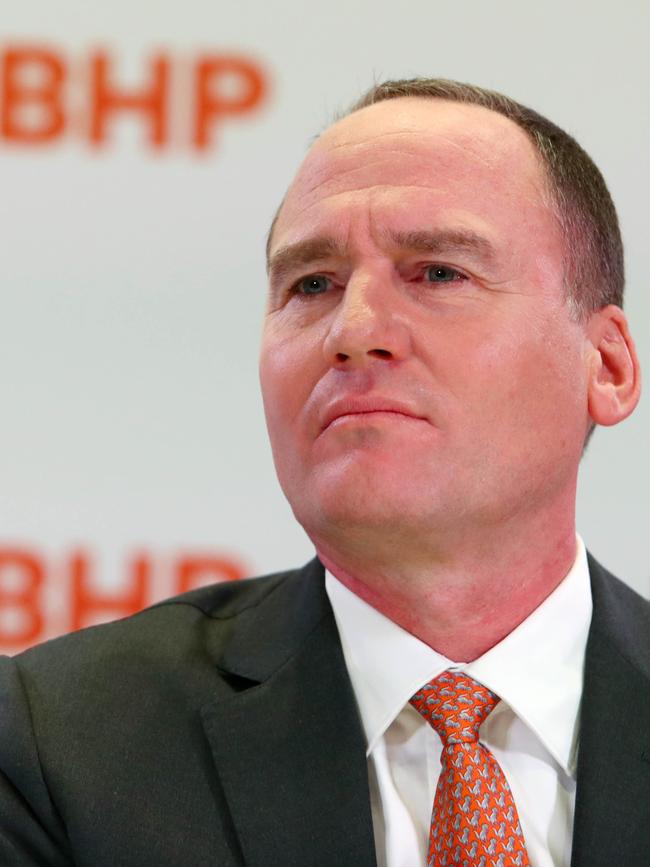
BHP CEO Mike Henry talks up the prospects for the project but the sunk capital costs alone make it a tough decision for MacKenzie and his board.
If the company had its time again it would have either pressed the start button some time ago or simply walked away. To spend so much without earning a cent is not the way BHP likes to do business.
Perry Williams 2.38pm: Big energy backs review of ACCC’s LNG netback method
Big energy users have backed a review of the ACCC’s LNG netback methodology as they push for the introduction of a new pricing mechanism to ease the cost of domestic gas on Australia’s east coast.
Frustration over gas prices has grown after a deal between Scott Morrison and big LNG exporters in January avoided formal price controls, which some big manufacturers had pushed for but were strenuously resisted by the LNG industry.
The ACCC has announced a review of the pricing benchmark, providing ammunition for industrial users as they push for a change in the benchmark method for east coast prices to be included in a code of conduct for the gas industry due by the end of February.
“The ACCC’s current netback methodology only excludes recovery of short-term export-related costs, and domestic gas users fear this leaves them exposed to the longer-term costs of LNG export infrastructure they don’t use or benefit from,” a joint statement by major gas users’ said.
“Our own immediate focus is the joint work of our organisations on behalf of gas users to negotiate with gas suppliers on a Code of Conduct that we all hope will make a positive contribution and improve outcomes for domestic gas users.”
Manufacturers say they can’t find gas on a contracted basis for less than $8 to $10 a gigajoule, more than double historic levels.
They want changes to the competition regulator’s LNG netback formula — effectively the price of LNG shipped overseas less processing and shipping costs. Instead, they have called for the removal of an implicit cost premium built in to pay back the cost of the giant LNG export plants used to ship gas to Asian buyers saying the cost of LNG capital accounts for $2 to $3 a gigajoule in the final price that domestic users pay for gas.
The gas users collective comprises lobby organisations the Ai Group, Chemistry Australia, Manufacturing Australia and Energy Users Association of Australia.
David Swan 2.17pm: Hubspot passes 100,000 paying customers
Marketing and sales software start-up Hubspot has just passed 100,000 paying customers and $1bn in annual recurring revenue, and its co-founder and CEO Brian Halligan says the company’s 15-year journey has been a story of ‘one step backward, two steps forward’.
Speaking to The Australian to mark the dual milestones, Halligan says Hubspot’s path to Wall Street success has been anything but easy. The failure rate for start-ups is about 90 per cent, and the executive says in the early days “we didn’t have any money, we didn’t have any customers and we didn’t know what the heck we were doing.”
“I would say it’s been tough all the way,” Halligan says.
“It‘s been a constant evolution but we’re also constantly evaluating where we are at. For other start-ups, I’d say look at yourself in the mirror and ask really tough questions. And don’t be afraid to take that step back so you can take two steps forward. That’s sort of how I think about the journey.
“The more we take those steps back and really reflect on what we‘re doing, the faster we grow it seems. And we haven’t been shy about doing that. We made lots of decisions along the way that were a little counterintuitive that probably slowed growth down a lot in the short term but really enabled us to speed up a lot in the long term.”
Lachlan Moffet Gray 1.58pm: Zip Co speeding ticket as US listing rumours swirl
Buy now pay later provider Zip Co has responded to a “speeding ticket” issued by the ASX after its shares jumped 22 per cent since Monday on rumours the company is considering a US listing.
In a letter to the ASX, Zip Co claimed it was not aware of any unreleased information that could account for the recent share price increase, attributing it to general market interest in the BNPL sector and recent company events.
“The company notes that there has been significant interest in the Buy Now Pay Later (“BNPL”) market generally,” it said.
“Furthermore, specific to Zip, the company has recently advised the market of the following positive events: Successful placement in late 2020 and oversubscribed share purchase plan in early 2021...and...A trading update for Q2FY21 announced on 21 January 2021, which confirmed extremely strong quarterly trading results year on year.”
Zip Co will hand down its half year results on Thursday February 25.
It is currently trading at around $13.50 a share, up from $11.06 on Monday morning.
Eli Greenblat 1.38pm: Collins Foods to return Sizzler JobKeeper
Fast food chain owner Collins Foods is the latest retailer to return JobKeeper payments to the federal government and follows from businesses such as Domino’s, Nick Scali and Adairs that have sent back the wage subsidies after booking solid lifts in profits for the December half.
Collins Foods, which is a key owner of KFC restaurants in Australia as well as Taco Bell and Sizzler, said it will be returning JobKeeper payments of $1.8m received during fiscal 2021 for Sizzler Australia operations.
Collins Foods received that amount in JobKeeper subsidies from the Australian government following a decline of more than 30 per cent in revenue in its Sizzler Australia division’s nine remaining restaurants early in the pandemic - the threshold for access to the federal government’s stimulus program designed to keep people in jobs.
Of the three restaurant brands that Collins Foods operates, Sizzler was hardest hit during the COVID-19 pandemic and the company decided to close down the Sizzler brand.
Even though Sizzler employees would continue to be entitled to JobKeeper until their restaurant closures, Collins Foods decided from the date of the closure decision that it would not continue to seek the JobKeeper allowance from the Australian federal government. Instead, it topped up payments to the equivalent JobKeeper payment they would have received as part of the government program.
Collins Foods’ chief executive Drew O’Malley said: “With the onset of the pandemic many activities that we all hold dear, like eating together in restaurants, faced an uncertain future.
“We claimed JobKeeper payments for our Sizzler business in the spirit of the program’s intent, which was to help support the job security of our 600 dedicated Sizzler employees during a time where sales were down well over 50 per cent.”
Eli Greenblat 1.33pm: Breville shares slump after dividend cut
Home appliances group Breville has surprised its investors by holding back some of the cash flooding its coffers from a surge in consumer spending during the pandemic.
It has decided to slash its dividend by a third, as it directs its accelerating earnings to new growth opportunities.
This could pay off in the longer term, as Breville upped its earnings guidance for fiscal 2021.
But the market doesn’t like surprises and shares in Breville slumped 5 per cent to $29 on the slimmer dividend payout.
Breville, whose biggest shareholder is Solomon Lew’s family and his Premier Investments company, which have a combined stake of 32 per cent, hit a milestone in calendar year 2020 as it cracked $1.1bn in sales for the first time, accelerating earnings growth.
Investors will in the short term miss out on the boom when it comes to dividends.
1.24pm: Consumer sentiment eases after snap lockdowns
Consumer sentiment, as measured by Roy Morgan and ANZ, eased by 2 per cent in the first half of February due to virus concerns, notes CommSec senior economist Ryan Felsman.
“Sentiment had hit 15-month highs at the end of January, but snap Covid-19 lockdowns in both Victoria and Western Australia have dampened consumer spirits.
‘Border closures have disrupted late-summer holiday plans and affected business supply chains. ANZ economists reported that consumer sentiment in Melbourne slid by 5.4 per cent last week after Melburnians entered their third lockdown at 11.59pm on Friday 12 February.
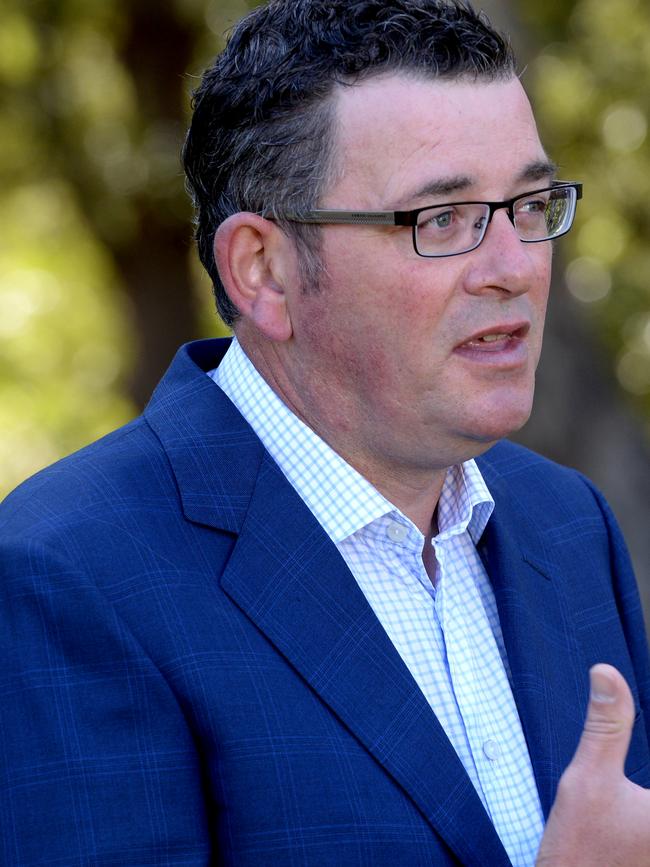
“While Commonwealth Bank (CBA) household credit and debit card spending is likely to fall sharply in Victoria this week, observed historical data shows that spending tends to bounce-back quickly once government restrictions are lifted,” says Felsman.
Victorian Premier Daniel Andrews said yesterday that the state was “well placed” to lift restrictions at 11.59pm tomorrow evening due to low Covid-19 case numbers over the first few days of the lockdown.
Patrick Commins 1.09pm: Victoria lags in national jobs recovery
Victoria continues to lag the national jobs recovery, with payroll figures showing 1.7 per cent fewer Victorian employees in the final week of January versus a year earlier.
As Melbournites suffer through another lockdown, the new figures from the Australian Bureau of Statistics showed that the number of payroll jobs had followed a seasonal pattern to lift across all jurisdictions and industries in the back half of January.
Nationally, the data showed there was a 1.3 per cent lift in employees registered in the ATO’s single-touch payroll system between the weeks ending January 16 and 30, leaving the same number of employees nationally as there were a year before.
ABS head of labour statistics Bjorn Jarvis said “payroll jobs continued to follow a seasonal pattern, increasing through January”, with all jurisdictions and industries recording gains.
The latest data provide further evidence that the post-COVID labour market recovery extended into 2021, despite a summer of brief lockdowns and border closures.
Official labour force statistics due on Thursday are expected to show a 30,000 lift in employment in January, and a drop in the jobless rate from 6.6 per cent to 6.5 per cent, based on consensus economist forecasts.
Last week the Department of Social Services reported around 100,000 fewer JobSeeker recipients last month, although the number of Australians on welfare remains well above pre-pandemic levels. Consumer confidence is at around 10-year highs, buoying hopes that households will continue to spend beyond the end of major income support measures in late March.
In the two other big east coast states, the ABS data showed a similar picture of a payroll jobs recovery that is largely complete: NSW weekly payrolls were 0.1 per cent down versus 12 months ago, while Queensland was 0.2 per cent higher.
The ABS figures also showed there were 3.5 per cent more payroll jobs in Northern Territory than a year prior, and around 2.5 per cent more in Western Australia and South Australia. In contrast, Tasmanian weekly payroll jobs were tracking 1.7 per cent below 2020 levels.
The scars on some industries, however, remain deep.
There were more than 10 per cent fewer patrolled employees in hard-hit segments such as accommodation and food services and education and training than there were in March, the ABS data showed.
David Ross 1.02pm: Sole operators boom as business start-ups rise: ABS
Australia added 46,651 additional businesses across the country in 2020, despite a crippling pandemic and lockdowns that smashed high streets and shopping centres across the country.
The latest data released by the Australian Bureau of Statistics (ABS) shows 344,472 new businesses entered the economy in 2020.
That compares with 297,821 businesses that failed and exited the economy in the same year.
It’s an overall 2 per cent growth in the number of businesses in the economy, but a slight decline from a peak in 2018-2019, where 355,722 new businesses were added.
Solo operations were on the rise, growing 3.5 per cent in the ABS figures, to a total of 687,571 for the year.
Sole proprietors experienced an entry rate of 21 per cent, potentially reflecting the rise of the gig economy. Business partnerships dropped by 3.3 per cent.
Medium-sized businesses employing between 20 and 199 people shrank 12.3 per cent and businesses employing more than 200 people declined 5.3 per cent, shedding 231 operators.
The biggest growth areas were transport, postal and warehousing; professional, scientific and technical services; and healthcare and social assistance.
Those three industries accounted for more than half the net increase in new businesses for the year.
Agriculture, forestry, and fishing was the worst affected industry category across the economy, down 1 per cent for the year.
This was followed by manufacturing, mining, and information media and telecommunications.
Tasmania was the best performing state, where total businesses grew 3.8 per cent.
The state’s economy added an additional 1500 operators.
Victoria grew 3 per cent while Western Australia added just 0.5 per cent.
Eli Greenblat 12.58pm: Former CUB boss Ari Mervis joins McPherson’s board
Consumer health and wellness products supplier McPherson’s has appointed the former boss of Carlton & United Breweries and Murray Goulburn, Ari Mervis, as an independent, non-executive director, effective immediately.
Mr Mervis has extensive global experience which spans a range of industries in branded goods, consumer staples, agriculture, food and beverages.
His recent executive roles have been executive chairman of Accolade Wines, MD and CEO of Murray Goulburn, and prior to that he spent 27 years at global brewer SABMiller where his career culminated as CEO of Carlton & United Breweries and MD Asia Pacific - a member of the global leadership team.
He was also chairman of SAB India and SAB Vietnam and he motivated and completed the $US10.2bn acquisition of Foster’s (CUB) by SABMiller.
Cliona ODowd 12.35pm: Super funds positive, up +3 per cent: Chant West
Super funds have kept up the positive momentum in the first few weeks of the year, returning close to 3 per cent by mid-February, according to research house Chant West.
While the median growth fund was up just 0.2 per cent in January, February has been more positive, with an estimated 2.5 per cent gain to date, Chant West senior investment research manager Mano Mohankumar said.
The median growth super fund has now returned more than 18 per cent since March last year, after the solid gains following the 2020 market crash were boosted by further positive returns in the first few weeks of 2021.
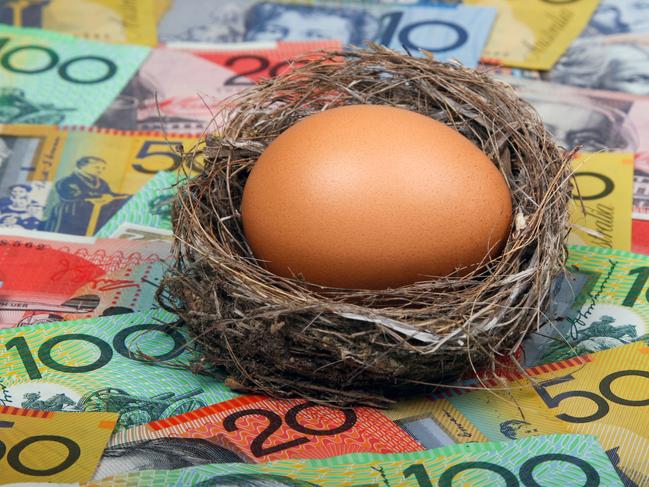
“In January, emerging markets outperformed developed markets despite a sell-off late in the month on concerns around a resurgence in COVID-19 cases.
“The US share market experienced increased volatility as a result of highly unusual and targeted trading by a segment of retail investors. This overshadowed the underlying investor optimism brought about by President Biden’s proposed stimulus plan,” he said.
Australian shares were up 0.3 per cent over January but this was offset by the weaker performance in international shares, which returned -0.2 per cent and 0.1 per cent in hedged and unhedged terms, respectively.
12.05pm: ASX +0.5%; banks, resources strong
Australia’s sharemarket continues to benefit from buoyant offshore markets and strong earnings reports.
The S&P/ASX 200 was up 0.5 per cent at 6901.8 at midday, on track for its highest daily close in almost 12-months.
The index hit an early high of 6913.7, which was its highest point since 25 February 2020.
While the US market was closed on Monday, S&P 500 futures were up 0.5 per cent in APAC trading.
That follows a strong night in UK and European markets amid growing optimism about Covid vaccines.
Australian earnings reports added to the optimism with BHP up 2.3 per cent on a strong dividend payment.
Rio Tinto and Fortescue are tracking BHP with gains of 3.4 per cent and 1.7 per cent before their reports this week.
Banks were higher, but trimmed early gains with NAB up 0.7 per cent after its trading update showed a big fall in bad debt provisions and better margins.
Zip Co surged 12 per cent amid short covering amid talk that a US listing might follow its roadshow last week.
Treasury Wine fell 6.2 per cent, while GWA Group lost 5.9 per cent and Domain lost 4.3 per cent after their results.
CBA, Magellan, Computershare and IAG shares fell after trading ex-dividend.
Lilly Vitorovich 12.00pm: Seven West content deal could reap $39m-$69m annually: JPM
Seven West Media could receive between $39.5m-$69.2m annually from its freshly-inked content deal with Google for the tech giant’s Showcase product, according to JPMorgan, based on its analysis of Google’s Showcase showdown in France.
“Reminiscent of Bob Barker’s ‘Showcase Showdown’, both SWM and NEC have been given a chance to spin Google’s Showcase wheel, and SMW is happy with the first spin - signing a contract to get paid for content appearing within the platform (NEC much less-so),” JPMorgan says in research note.
JP Morgan says Showcase, which was launched in Australia earlier this month, pays publishers for content appearing within the Showcase platform but not stories that appear in search results.
“This comes at an opportune time with the media bargaining code legislation,” JPMorgan says.
Seven announced the Google deal on Monday and also reported solid 1H results, including a big drop in costs and net debt.
Due to lower costs, JPMorgan lifts its FY21 Ebitda forecast to $293.5m from $213.4m. It has also upped its FY22 Ebitda forecast to $258m from $202m.
Broker retains overweight rating on Seven and 55c price target.
Seven shares up 16 per cent, or 8c, to 58c, while shares in Nine Entertainment gain 2.9 per cent, or 8c, at $2.82.
READ MORE: Seven West Media strikes deal with Google, swings to net profit
11.43am: Premature to consider withdrawing monetary stimulus: RBA
The RBA is monitoring the effects of easy monetary policy on the economy but there are few signs of a deterioration in lending standards at this point.
In a discussion on the effect that low interest rates have on financial and macroeconomic stability, the RBA board acknowledged the risks inherent in investors searching for yield in a low interest rate environment, including risks linked to higher leverage and asset prices, particularly in the housing market.
However it concluded that there were “greater benefits for financial stability from a stronger economy, while acknowledging the importance of closely monitoring risks in asset markets”, according to the minutes of its February board meeting, at which it announced an extension of its quantitative easing program.
“Members concluded that very significant monetary support would be required for some time, as it would be some years before the Bank’s goals for inflation and unemployment were achieved,” the minutes said.
“Given this, it would be premature to consider withdrawing monetary stimulus.”
The minutes also said the QE program had helped to lower interest rates and had “contributed to a lower exchange rate than otherwise.”
11.38am: Aussie wheat crop set to surge to record 33.34m tonnes
ABARES raised its estimate of national production of winter crops by 7.4 per cent to 55.2 million tonnes in 2020-21, notes CommSec.
“Australia’s wheat crop is expected to surge by a whopping 119.8 per cent to a record 33.34 million tonnes over the period. Chicago wheat futures prices are around the highest level since 2014 at US$636.75 a bushel as Russia curbs exports to protect domestic supplies and cold weather threatens crops in the Northern Hemisphere.
“Agricultural economists are also forecasting that Aussie barley production could increase by 45.5 per cent to 13.09 million tonnes in 2020-21 with canola output up by 73.9 per cent to 4.05 million tonnes.”
Widespread rainfall and improving growing conditions in Australia’s wheat belt are boosting farm exports to grain-hungry China, says Ryan Felsman, senior economist at CommSec.
“Aussie rural exports surged 18.4 per cent in December – the most in 25 years – on the back of a massive 75 per cent lift in the value of cereal exports to $1.15bn. And the lift in export income is set to continue.”
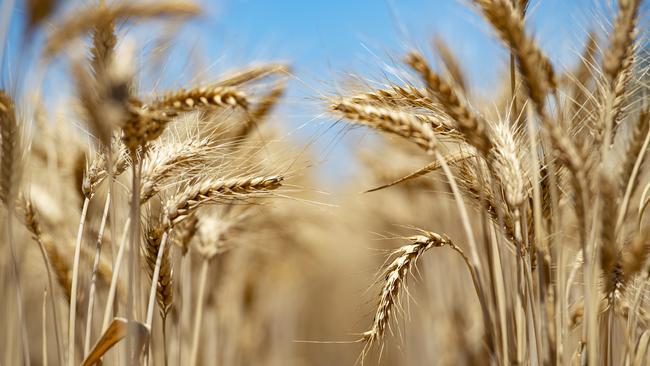
11.31am: More than half NZ population watches Netflix
Roy Morgan CEO Michele Levine says the new competition in the New Zealand subscription TV market over the past year with the entry of Disney+ means consumers have been the big winners with a wider variety of content available to view:
“Over 2.8 million New Zealanders (68% of the population) now watch Subscription TV in an average four weeks. Although growth has slowed in the overall market with an increase of only 4.9% viewers from a year ago there has been faster growth for the newer services in the market.
“Disney+ has been the stand-out performer during 2020 with the service which was launched in the final months of 2019 already attracting 700,000 viewers within a year of launching and becoming the third most watched Subscription TV service already.
“Amazon Prime Video has been in the market since late 2016 but really experienced strong growth during 2020 and increased its viewership by 141,000 to 323,000, an increase of 77.5% on a year ago.
“However, despite the fast growth for both Disney+ and Amazon Prime Video, the clear market leader is again Netflix which is viewed by over 2.1 million New Zealanders in an average four weeks – more than half of the population.
“Also in a strong position in the market is Sky which includes under its banner Sky TV, the Sky Sport Now sports streaming service (formerly FAN PASS) and the Neon streaming service. During mid-2020 Sky purchased the Lightbox streaming service and merged this into Neon in June 2020. Across these different services Sky now attracts an audience of 1,248,000 viewers – around one-in-three New Zealanders.”
11.16am: Could BHP pay out even more next time?
BHP is likely to unveil an even larger payout for shareholders come its FY2021 result in August, as long as commodity prices remain robust, Jefferies reckons.
It is worth noting BHP has already used almost all of its calendar year 2020 free cash flow for dividends, Jefferies says.
BHP is paying a record interim dividend of $US1.01/share.
Still, “the strong balance sheet could have justified an even larger capital return”, says Jefferies.
Net debt is below BHP’s target range and the miner is expected to benefit from strong prices for commodities such as iron ore.
Dow Jones Newswires
11.08am: Nearmap target raised to $3.10: Canaccord
Canaccord’s Owen Humphries raised his Nearmap target price 7 per cent to $3.10 while reiterating his Buy rating after NEA’s interim report yesterday.
That puts him almost in line with Bloomberg’s consensus target price of $3.14. The consensus is bullish with 8 of 9 analysts holding a Buy or equivalent rating.
Mr Humphries says Nearmap’s business is performing better than previously expected with upside risk to constant currency annualised contract volume guidance if new customer sales improve in line with an improved economic environment.
“While there is likely to be short-term ACV/earnings downgrades relating to currency movements and an accelerated investment program, we believe the company has the opportunity to become a global leader in the large aerial imagery and location intelligence market,” he says.
He notes that the company appears to be gearing for a strong FY22 that will likely herald accelerating ACV growth with an improved unit economics (sales contribution ratio) and positive incremental data points that will likely be viewed positively by the market.
“In our view, NEA remains a stock investors should hold over the long term given our view of its long-tailed growth opportunity - globally applicable technology and unique subscription business model,” he argues.
“If NEA executes to plan and returns the business to its targeted 20-40 per cent increase in top-line growth, we believe the stock would trade on an enterprise value to annualised contract volume of 6 times in FY23, which remains well below its global enterprise software peers (averaging 11.1 times).”
Nearmap shares have risen 4 per cent to a 3-month high of $2.68 this morning despite an update by J Capital on last week’s short sell recommendation.
Perry Williams 10.42am: ‘Australians should be outraged’ by gas price discrepancies
Big gas users say the ACCC’s latest findings confirm some domestic customers are still paying more for supplies than international buyers of Australia’s gas.
Energy Minister Angus Taylor said he was concerned with findings in the report that “Australian gas users are not always receiving internationally competitive prices”.
Industry group Manufacturing Australia said the competition regulator’s report confirmed buyers’ fears that reforms are needed for the market.
“This is the tenth consecutive ACCC report that finds gas companies are charging Australian customers higher than export parity prices. Every Australian should be outraged by that,” Manufacturing Australia chief executive Ben Eade said.
“It should also put paid to the recent, absurd, claims by gas producers that they are being asked to “subsidise” their customers. If anything, the ACCC reports highlight that Australian customers have been subsidising gas companies’ export investments for most of the past decade. That’s not sustainable.”
“Customers will continue to seek a fairer, more liquid, more transparent and more competitive gas market in Australia, as is being advocated by the ACCC,” Mr Eade said.
David Swan 10.41am: JCap sends new short salvo at Nearmap
Beijing-based activist short seller J Capital has fired a fresh salvo at Nearmap, declaring the aerial map maker is avoiding answering key questions about its US business.
Nearmap was the ASX’s best performing stock on Monday, after it responded to a report from J Capital that alleged its US business was severely underperforming, and that its technology advantage had been eroded by competitor Eagleview. The attack last week sent Nearmap’s shares down by 10 per cent in one hour, but on Monday it was up by 19 per cent, sending short sellers underwater.
“Nearmap did not dispute that the Eagleview camera system is twice as efficient,” J Capital said in a fresh report Tuesday. “No attempt was made to demonstrate market-share improvement in the US. Then company obfuscated pricing strategy with obtuse language that does not refute any of our statements.
“We continue to believe that Nearmap cannot compete in North America. We now also believe that the company is losing share in Australia and New Zealand.”
NEA turned up 2.7 per cent to a fresh 3-month high at $2.64 after falling 2 per cent in early trade.
10.28am: ASX rises 0.7 per cent to 12-month high
Australia’s sharemarket surged to its highest level in almost 12-months after strong gains in Europe and positive earnings reports domestically.
The S&P/ASX 200 rose 0.7 per cent to 6913.7 points in opening trading, breaking last week’s high of 6901 to reach its highest point since Feb 25th 2020.
BHP rose 2.5 per cent on a strong dividend payment and NAB gained 2.3 per cent as a massive fall in impaired loan charges offset a weaker net interest margin in its 1Q trading update.
Those reports flowed through to the other iron ore miners and banks, respectively, with Rio Tinto up 3.1 per cent and Westpac up 2.1 per cent, while CBA fell 0.7 per cent ex-dividend.
Virgin Money, Zip Co and Bendigo Bank jostled for best performing ASX200 stock with Bendigo up 5 per cent after broker upgrades following a strong report on Monday.
But the S&P/ASX 200 has trimmed its gain with CSL down 0.6 per cent, Wesfarmers down 1.1 per cent and Treasury Wine down 8.5 per cent
A daily close above 68882.6 would make it the best in almost 12 months.
S&P/ASX 200 last up 0.3 per cent at 6888.
10.11am: Strong upgrade momentum for BHP: Macquarie
Macquarie Equities analyst Hayden Bairstow sees a continuation of strong upgrade momentum for BHP after its interim results.
He says the 1H21 results itself was “mixed” with in-line EBIDTA and cash flow and weaker earnings offset by a higher interim dividend.
Currency headwinds put pressure on costs with capex guidance increased slightly.
But buoyant iron-ore prices are underpinning “strong upgrade momentum” for BHP.
Mr Bairstow estimates that a spot price scenario generates about 30 per cent and 90 per cent higher earnings than his forecasts for FY21 and FY22, respectively.
And BHP’s free cash flow yields at spot prices are 18-20 per cent for FY22-FY23.
BHP shares rose 2.5 per cent to a 3-week high of $46.90 in early trading.
Last up 1.9 per cent at $46.63.
10.07am: Tin surges nearly 17 per cent on LME: CBA
Spot tin prices surged nearly 17% on the LME yesterday, notes Commonwealth Bank’s Global Markets Research team.
“Spot prices are still about 12% lower than record‑highs reached in April 2011. Prices have increased this year on the back of declining stockpiles and strong industrial demand particularly for semi‑conductors and electronics,” the team said.
“Supply is simply struggling to keep up with demand. The metal usually attracts less attention than its base metal peers because of its low liquidity. However, investor interest is growing, particularly in China’s Shanghai Futures Exchange.”
Lilly Vitorovich 10.01am: Morningstar raises Seven West Media estimates
Morningstar has increased its FY21 and FY22 Ebit estimates on Seven West Media by an average of 80 per cent following the media group’s 1H results.
The Kerry Stokes-controlled group reported on Monday that it had returned to a statutory net profit of $116.4m in 1H21 from a net loss of $49.4m and cut its net debt by $68m to $329m.
“The better than expected progress in balance sheet repair has vaporised our key concern regarding the group’s financial position,” media analyst Brian Han says in a research note.
Han also removes his previous 50 per cent probability assumption of zero value in Seven’s equity and reverts his fair value estimate to an intrinsic basis.
“Our fair value uncertainty rating has been cut to high, from extreme,” he said.
Morningstar’s standalone fair value estimate has been raised to 43c a share from 20c, “mainly reflecting the stellar cost-out efforts’’.
Operating expenses fell 18 per cent in 1H from a year ago and are on track to be 9 per cent lower for the 2021 financial year.
“Seven’s cost structure has been right-sized just in time to enjoy the operating leverage from a likely improvement in its free-to-air TV advertising revenue share from the current June-half,” Han says. He forecasts 38.2 per cent in FY21 from 37.4 per cent in FY20.
“The swifter-than-expected ratings turnaround vindicates management’s content
strategy refresh, to one focused on externally sourced tentpole franchises,” Han says.
Lachlan Moffet Gray 9.50am: 4WD, outdoor love drives ARB profit rise
4WD accessories retailer and manufacturer ARB Corporation has more than doubled its profit for the first half of the financial year and boosted its dividend after “pent-up” demand for outdoor recreation attributable to the COVID-19 lockdowns translated to higher sales.
The company’s net profit after tax was $54m, up 113.5 per cent on the $25.29m achieved during the previous comparable period.
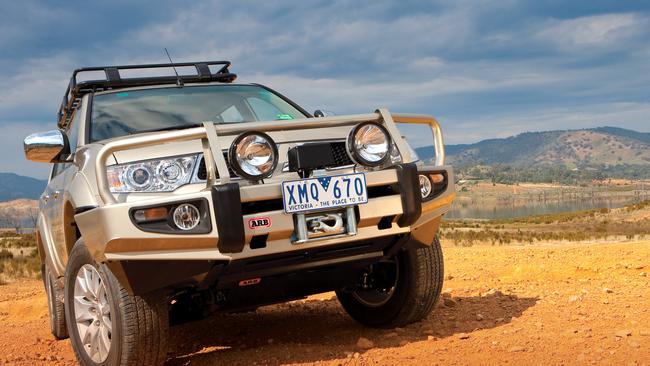
Sales revenue increased 21.6 per cent to $283.9m while a fully franked interim dividend of 29c a share was declared, up 56.8 per cent on last year’s interim distribution.
The company said gross margin was helped by cost containment, efficiencies and an improved Australian dollar against the Thai baht.
A JobKeeper subsidy of $9.8m was also received during the period.
ARB Corporation said it had a positive “short-term” outlook based on its customer order book but did not give specific full-year guidance due to the continuing uncertainty of the pandemic.
9.45am: Dividend to rally BHP shares: RBC
BHP’s stronger-than-expected dividend should drive “more positivity” on BHP shares, according to RBC’s Pekar Kaan, who reiterates his Outperform rating at $55 target price after today’s results.
He says it was a “fairly plain vanilla report from BHP at first glance” since most one-offs were pre-reported, with EBITDA of $US14.7bn near the $US14.8bn consensus and EPS a fractional miss at $US1.194 vs $US1.21 expected.
However, cash generation was better than expected with net debt at $11.8bn vs $12.3bn expected.
“This opened the door for BHP to pay out a record half year dividend,” Mr Kaan says.
He notes that BHP’s $US1.01 per share interim dividend beat the $US0.81 consensus despite recent upgrades.
He feels the 85 per cent payout ratio, roughly equivalent to the free cash flow generated in the period and translating to a 10 per cent free cash flow yield “will serve to drive even further income-based rerating.”
And a strong overall cost performance will reassure investors in his view.
BHP closed Monday at $45.75.
9.30am: Spending improvements widespread in Jan: CBA
Appetite for property ticked higher in January 2021, with combined CBA and Google data showing an increase in home buying intentions, as well as higher spending intentions in travel and health and fitness.
The Commonwealth Bank Household Spending Intentions (HSI) series signals a January 2021 pick-up in prospective spending on residential property, travel and health & fitness among Australian households.
CBA chief economist Stephen Halmarick said the data showed widespread improvement in spending intentions despite some Covid-related lockdowns in pockets of the country at the start of the year.
“Our view remains that the Australian economic recovery from the Covid-19 recession is well underway,” Mr Halmarick said, adding that CBA forecasts the economy to grow 4.2% in 2021, while the unemployment rate is expected to fall to 5.7% by year-end.
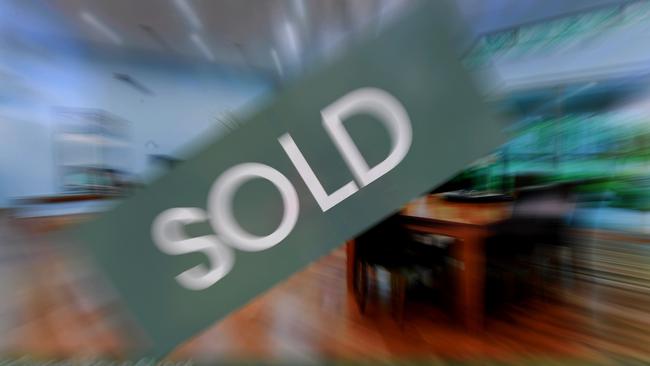
9.27am: What’s impressing analysts today?
- Altium raised to Buy: UBS
- Asaleo Care cut to Neutral: CS
- Baby Bunting started at Buy: $6.50 target price: Ord Minnett
- Beach Energy cut to Sell: GS
- Beach Energy target price cut 13 per cent to $1.73; Neutral rating kept: Citi
- Bendigo & Adelaide raised to Neutral: GS
- Bendigo & Adelaide raised to Hold: Jefferies
- Bendigo Bank target price raised 5 per cent to $10.50; Neutral rating kept Citi
- GPT Group raised to Buy: Jefferies
- GPT Group raised to Outperform: CS
- Smartgroup cut to Neutral: Macquarie
Richard Gluyas 9.26am: NAB soured loans plunge as cash earnings rise
A sharp fall in loan impairments has enabled National Australia Bank to report cash earnings of $1.65bn for the December quarter, up 47 per cent on the quarterly average in the second half of 2020.
The value of soured loans plunged to only $15m, down 98 per cent from the previous quarterly average.
This reflected top-ups and forward-looking adjustments in the second half which did not recur in the latest quarter.
Chief executive Ross McEwan said NAB’s underlying performance had been sound in a competitive, low-interest rate environment.
“Improving economic and health outcomes in Australia and New Zealand are encouraging, as are the reductions we are seeing in deferral balances,” Mr McEwan said.
“However, there are still a number of uncertainties requiring further clarity.
At an operating level, cash earnings before tax and impairment charges fell 5 per cent compared to the quarterly average, with revenue declining 3 per cent after lower treasury and markets income due to the non-repeat of mark-to-market loss reversals.
The net interest margin declined but was stable excluding the impact of treasury and markets and higher liquids.
Competition and the impact of low interest rates were offset by home-loan repricing and lower funding and deposit costs.
Lachlan Moffet Gray 9.18am: Crown formally ‘unsuitable’ for Sydney gaming licence
The NSW Independent Liquor and Gaming Authority has formally served Crown Resorts with a letter confirming the company’s unsuitability to operate its Barangaroo Casino under its restricted gaming licence.
Although ILGA confirmed Crown’s unsuitability last Tuesday when the Bergin report into the company was tabled in parliament, the stipulations of the restricted gaming licence mean the two parties must now enter into a formal process of negotiation.
ILGA chair Philip Crawford has previously indicated he believes Crown chair Helen Coonan can make the necessary changes to restore the company’s suitability before the year ends.
READ MORE: Mitchell defies pressure to exit Crown
9.12am: Cost cutting, JobKeeper boost Domain; listings growing
Real estate classifieds website Domain has boosted its half year profit by more than 50 per cent after managing to drive down expenses through cost discipline and use of the government’s JobKeeper scheme.
The company recorded a net profit of $19.4m, up 52.2 per cent on the prior comparable period, despite revenue declining by 3.8 per cent to $137m.
Expenses declined 14.5 per cent due to a “a multi-year strategy to drive cost discipline” and the receival of $8.3m in JobKeeper wage subsidies.
Despite booking a profit, Domain said it would defer consideration of a dividend payment until the end of the financial year.
The company said it anticipated a strong second half of the year, with listings growth particularly noticeable in Melbourne over January but said the absence of the government’s JobKeeper scheme will increase costs in the “mid to high” single digit range over 2020.
9.10am: Sims turns a profit; raises dividend
Scrap-metal merchant Sims reported a first-half profit, versus a loss the same time a year ago, as it benefited from higher metal prices and recent cost cutting.
The company recorded a net profit of $53.0 million for the six months through December. That compared to a net loss of $91.1 million in the same period the year prior.
The company raised its interim dividend to 12.0c a share, from last year’s half-year payout of 6.0 cents a share. Sims didn’t pay a final dividend for last fiscal year, ended June 30, 2020, as it grappled with market volatility because of the Covid-19 pandemic.
Dow Jones Newswires
9.07am: ASX may hit 11-month high
Australia’s sharemarket may hit an 11-month high amid buoyant global markets.
Overnight futures relative to fair value suggest the S&P/ASX 200 index will open about 0.2 per cent near 6883.
A daily close above 6880.68 would be the highest daily close in almost 12 months. The equivalent level on an intraday basis is 6901 points.
CBA, CPU, IAG, JHG, MFG and MIN trade ex-dividend today.
While the US market was closed for Presidents’ Day, UK and European markets rose strongly with the FTSE 100 up 2.5 per cent and the Euro Stoxx 50 up 1 per cent.
Apart from RBA minutes and weekly payrolls data at 1130am today there are 11 ASX 200 companies including BHP and Brambles reporting and NAB’s quarterly trading update out.
BHP’s underlying 1H net profit of $US6.04bn missed Bloomberg’s consensus estimate of $US6.39bn by almost 6 per cent but the dividend beat estimates by 20 per cent with BHP paying $US1.01/share versus $US0.84/share.
WTI crude oil futures rose 1.1 per cent to a 13-month high close of $US60.12 a barrel as an “arctic freeze” in Texas cut Permian Basin crude oil production down 1 million barrels a day.
China and Taiwan remain closed for Lunar New Year holidays.
The S&P/ASX 200 rose 0.9 per cent to 6868.9 on Monday.
Eli Greenblat 8.37am: Adairs almost doubles interim dividend on strong sales
Home furnishings retailer Adairs has ridden the wave of people spending more money in their homes through extended lockdowns and the Covid-19 pandemic, with sales for the December half up 34.8 per cent to $243m and net profit up by 233.4 per cent to $43.9m.
It almost doubled its interim dividend.
The retailer delivered record sales and profitability at a time when its 43 greater Melbourne Adairs stores were closed for almost half the period due to Covid-19 related restrictions. Sales and underlying EBIT exceeded the December 2020 guidance after adjusting for the $6.1 million repayment of the JobKeeper wage subsidy benefit.
Adairs declared an interim dividend of 13 cents per share, up from 7 cents per share in 2020, and payable on April 16.
Chief executive Mark Ronan said: “The first half of fiscal 2020 was significant for Adairs with record levels of sales and profitability, the acquisition of Mocka and the finalisation of our domestic supply chain strategy. We continued to deliver above market sales growth with group like for like sales up 6.9 per cent and online sales up 31.6 per cent (excluding Mocka).”
It said in the first seven weeks of the second half Adairs generated like for like sales growth of 2.3 per cent and like for like gross profit growth of 8.5 per cent.
Adairs is forecasting full-year 2020 EBIT of $48m to $52m.
Lachlan Moffet Gray 8.37am: Redbubble profit rockets; investment next step
Online clothes and apparel marketplace Redbubble has booked a gross profit of $144m for the half year, up 118 per cent on the prior comparable period.
The company also swung into positive EBIT profit territory of $42m, compared to a $2m loss last financial year.
The company said it had seen strong customer demand into the peak holiday season across all geographies and categories, even as demand for reusable masks declined.
Marketplace Revenue of $353m for the period represented a 105 per cent gain on a constant currency basis.
Redbubble CEO, Michael Ilczynski, said: “The strategic priority for the group now is to ensure we extend the market leadership we have established.
“We intend to invest in both the artist and customer experiences, to improve loyalty and retention and to ensure long-term growth.”
Lachlan Moffet Gray 8.35am: GWA revenue drops, dividend down
Bathrooms and kitchens supplier GWA Group’s normalised half year profit has slipped 17 per cent to $20,014m as a resilient retail sector was offset by a decline in the commercial and multi-residential supply segments.
Revenue declined by 4 per cent to $197.2m while earnings before interest and tax fell 16 per cent to $32m.
A fully franked interim dividend of 6c a share was declared, down from 8c in the prior comparable period.
Managing director Tim Salt said margins were impacted by shipping delays.
“While our commercial order bank is up on the prior-year, we experienced timing delays in projects being drawn down which impacted margins and earnings for the first half,” he said.
“We have continued to respond to the short-term challenging market conditions by remaining disciplined on operational costs, ensuring the ongoing stability and efficiency of our supply chain and managing our working capital and cash flow accordingly.”
Nick Evans 8.33am: BHP declares record interim dividend as iron ore price surges
BHP will pay a record $US1.01 a share interim dividend on the back of the surging iron ore price, beating analyst expectations and returning a massive $US5.1bn to shareholders after a strong start to the financial year.
BHP booked a net profit of $US3.88bn on the back of underlying earnings before interest, tax, depreciation and amortisation of $US14.68bn, and after the company slashed the value of its thermal coal assets as it prepares them for sale.
While the statutory profits fell compared to the $US4.9bn it booked first half of the previous financial year, its underlying net profit of $US6bn was up 15.4 per cent.
Operational profit of $US9.8bn was up from $US8.3bn the previous comparable period, on the back of high iron ore prices, record production from it Pilbara mines and the rising copper price at the back end of the half.
Analyst consensus had tipped BHP’s underlying net profit at $US6.3bn, before impairments and other write downs, on the back of underlying earnings before interest and tax of $US11.57bn.
Analysts had expected BHP to return US84c a share in an interim dividend, or about $US4.24bn.
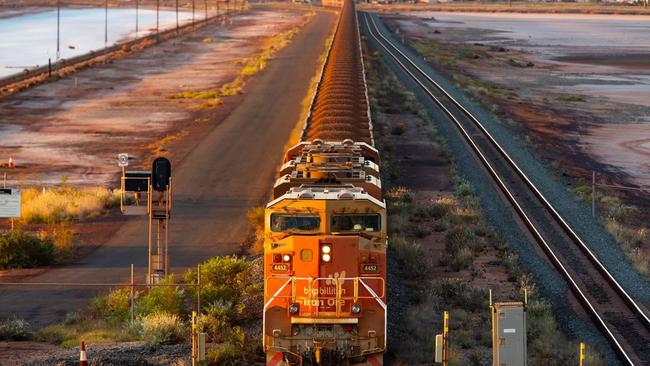
Eli Greenblat 8.29am: Breville ‘double digit growth’ boosts profit; dividend sliced
Home appliances group Breville has posted a 29.2 per cent rise in half-year net profit to $64.2 million as all regions for the company posted double digit growth and the working from home trend helped fill up kitchens and new home offices with a range of its toasters, sandwich makers and coffee machines.
However the December half dividend was almost sliced in half as the company decided to pivot its cash to growth opportunities.
Breville said on Tuesday that revenue for the period increased 28.8 per cent to $711m as earnings lifted 29.6 per cent to $94.6m. Improved gross margins, up 1.1 per cent, was driven by lower promotional spend, swing in mix to premium products, and a weaker US dollar, which more than offset increased freight costs.
Breville declared an interim dividend of 13 cents per shares, down from 20.5 cents last year, with the company saying the reduced payout reflected a decision to reduce target payout ratio to allow continued funding of growth opportunities on a cash-neutral basis.
Chief executive Jim Clayton said it was a good half for the group, building on the momentum seen over the last few reporting periods and benefiting from the work from home phenomenon.
“All regions and categories delivered growth, despite experiencing very different and erratic retail backdrops. We continued to accelerate our double-digit EBIT growth, while tactically investing in selected growth drivers and capabilities. Geographic expansion is delivering an increasingly diversified and balanced global portfolio, adding growth and resilience in a dynamic market environment.”
In the Americas revenue rose 29.1 per cent to $314.9m, in Europe, Middle East and Africa revenue rose 56.1 per cent to $145.3m and in the Asia Pacific revenue lifted 49.7 per cent to $132.8m.
8.01am: NAB cash earnings up 1 per cent; revenue down 3 per cent
National Australia Bank has reported a 1.0 per cent rise in unaudited first quarter cash earnings to $1.65bn.
Unaudited statutory net profit for the quarter was $1.7bn, NAB told the ASX.
Revenue declined 3 per cent.
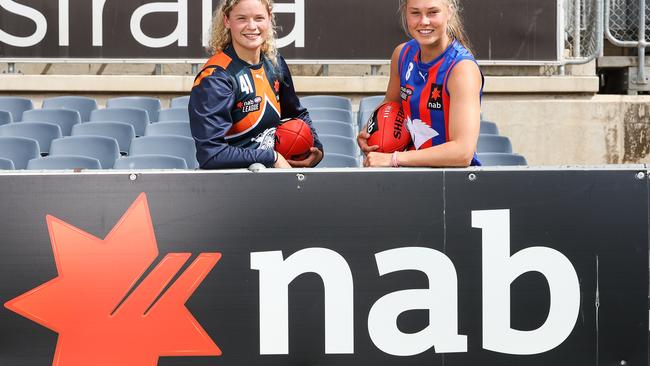
The bank said the revenue decline reflected lower markets and treasury income, mainly due to non-repeat of mark-to-market loss reversals in the second half of fiscal 2020.
Meanwhile, expenses for the period fell by 1 per cent with NAB saying that productivity benefits and lower restructuring related costs were partly offset by provisions for higher performance-based compensation.
“At an underlying level performance has been sound in the current competitive, low interest rate environment,” said NAB chief executive Ross McEwan.
Dow Jones Newswires
Jared Lynch 7.50am: Ansell posts ‘record organic sales’ as demand soars
Gloves and protective clothing maker Ansell has delivered “record organic sales” and earnings as demand continues to soar during the Covid-19 pandemic.
And the company is expecting demand to continue to persist in a post-pandemic world as people adopt better hygiene measures and developing countries apply improved safety measures.
Revenue surged 24.5 per cent to $US937.8m ($1.2bn) in the six months to December 31. Meanwhile net profit leapt 61.9 per cent to $US106.5m.
“We expect that Covid-19 will continue to impact the world for some time and once the pandemic is under control, elevated demand for our products is likely to persist, whether due to enhanced safety practices at plants and hospitals, better protection awareness in emerging markets, more research & testing activities worldwide or the potential need for annual Covid-19 vaccinations,” chief executive Magnus Nicolin said.
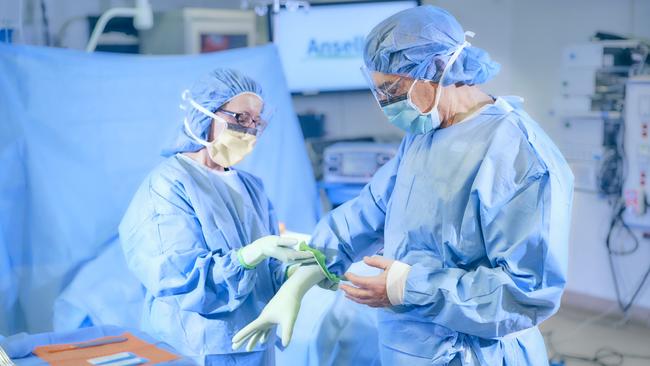
Ansell’s healthcare division was the main earnings driver, with overall sales rising 39.2 per cent to $US594.7m. This compares to revenue across its industrial business framing 7 per cent to $US388.1m.
Ansell will pay a dividend of US33.2c a share on March 10 - and increase of 52.6 per cent on last year’s payout. This reflects the company moving to a proportional dividend policy, targeting a payout ratio of 40-50 per cent.
7.35am: Reckon core cloud software focus after ReckonDocs sale
Reckon has sold ReckonDocs to NowInfinity, a wholly owned subsidiary of Class Ltd, and Class Ltd for $13m.
In a statement to the ASX, Reckon said the transaction is unconditional and expected to complete on 1 March 2021.
The deal will help to reduce Reckon’s debt and provide additional development funds for Reckon’s “cloud first” development strategy for small business accounting and payroll, and practice management for accountants and lawyers.
The division contributed revenue of $5m and EBITDA of $3m to the 2020 Reckon Group results.
The ReckonDocs Business is currently part of Reckon’s Accountant Practice Management Group for company formations, trust deeds and other related documents and services.
Reckon said the sale of this business will enable a stronger focus in Reckon’s core cloud software initiatives and tighter integration of its Accountants Group products with Class products over time.
7.10am: ASX poised to rise after markets extend gains
Australian stocks are set to open higher after strong rises in European markets, oil and copper. Wall Street was closed for a holiday.
At about 7am (AEDT) the SPI futures index was up 19 points, or 0.3 per cent.
Yesterday, Australia’s sharemarket closed 0.9 per cent higher, its best rise in six days.
Copper rose 0.8 per cent to $US8422.50 a tonne, its highest level since 2012, according to CommSec. Iron ore is unchanged.
Gold futures are down 0.2 per cent to $US1818.90 an ounce.
Brent oil is up 1.4 per cent at $US63.30 a barrel.
The Australian dollar is higher at US77.83c.
6.24am: Social network Parler announces relaunch
Conservative-friendly social network Parler announced it was relaunching after being forced offline over incitements to violence on the platform.
Parler, which calls itself “the free speech social network”, came under scrutiny following the January 6 attack on the US Capitol.
Apple and Google pulled the network’s app from their download platforms and Amazon’s web hosting service cut ties as well.
“Parler was built to offer a social media platform that protects free speech and values privacy and civil discourse,” interim CEO Mark Meckler said in a statement.
He added the network was determined to return despite being taken offline “by those who desire to silence tens of millions of Americans”.
Parler, which claims to have over 20 million users, said it was back for users that already had its app. New users won’t be able to get access until next week.
AFP
6.05am: Vaccine optimism sends oil back above $US60
The price of oil rose to its highest level in more than a year on optimism the rollout of vaccines will breathe new life into global economies.
Inoculation hopes and a tightening of supplies from the Organization of the Petroleum Exporting Countries (OPEC) has driven up oil prices in recent weeks to pre-pandemic levels.
U.S. West Texas Intermediate (WTI) crude futures rose 1.5 per cent, past the psychologically important $US60 a barrel to hit $US60.95 on Monday, a level not seen since early January of 2020.
Brent Crude was up 1.46 per cent to $US63.32 a barrel.
Analysts have raised alarms that oil prices could fall dramatically. While Demand for oil is low because of the pandemic, the concern is that producers might bring more supply online at these prices, which would send prices back down.
“The robust recovery in oil prices and industrial metals over the past couple of months is driving the idea of a new commodities supercycle in which prices remain above-trend for many years to come,” Hussein Sayed, chief market strategist at FXTM, said.
Dow Jones
4.50am: Markets extend rally on recovery hopes
Global stock markets and oil prices soared, boosted by progress on Covid vaccinations and increasing chances of a vast US stimulus, dealers said.
London equities jumped 2.5 per cent and the pound rallied following weekend news that more than 15 million people in Britain have so far received Covid-19 vaccines.
Sterling leapt to $US1.3918, which was the highest point since April 2018, while the euro sank to 87.18 pence, a level last seen in May.
Paris stocks soared 1.5 per cent and Frankfurt gained 0.4 per cent, while Milan won 0.8 per cent after former European Central Bank boss Mario Draghi was named Saturday as Italy’s new prime minister.
Wall Street was closed on Monday for US Presidents Day.
“There’s real momentum behind the global recovery trade and with every passing week, it seems investors are becoming more optimistic about it,” OANDA analyst Craig Erlam said.
“The vaccine rollout is providing enormous encouragement, with the UK surpassing 15 million vaccinations and the topic of conversation finally turning to reopening the economy,” he added.
Stocks have been surging for months as vaccination programs kick into gear and fewer people come down with the virus, fuelling hopes that economically painful containment measures can begin to be lifted.
Oil hit peaks not seen since last January, with New York crude topping $US60 per barrel, boosted also by supply fears amid a severe cold snap in key producer state Texas.
In Asia, Tokyo was the standout performer on Monday, with the Nikkei 225 breaking through 30,000 points for the first time in 31 years as data showed Japan’s economy performed better than expected at the end of last year.
Bitcoin retreated after hitting a new record of $US49,694.24 over the weekend after MasterCard and US bank BNY Mellon announced plans last week to make it easier for people to use the cryptocurrency. It stood at about $US48,400 on Monday.
AFP
4.48am: Okonjo-Iweala named first female, African WTO boss
Nigeria’s Ngozi Okonjo-Iweala was appointed as the first female and first African head of the beleaguered World Trade Organisation, saying a stronger WTO would be vital for the global coronavirus recovery.
The WTO called a virtual special general council meeting at which member states officially selected the former Nigerian finance minister and World Bank veteran as the global trade body’s new director-general.
She will take up her post on March 1 and her term, which is renewable, will run until August 31, 2025.
The near-paralysed institution desperately needs a kickstart -- something Okonjo-Iweala immediately addressed after being confirmed in the job.
“A strong WTO is vital if we are to recover fully and rapidly from the devastation wrought by the Covid-19 pandemic,” the 66-year-old economist said in a statement.
“I look forward to working with members to shape and implement the policy responses we need to get the global economy going again.
“Our organisation faces a great many challenges but working together we can collectively make the WTO stronger, more agile and better adapted to the realities of today.” South Korean Trade Minister Yoo Myung-hee had been the only other remaining contender for the post but pulled out when it became clear that new US President Joe Biden was swinging firmly behind Okonjo-Iweala’s candidacy.
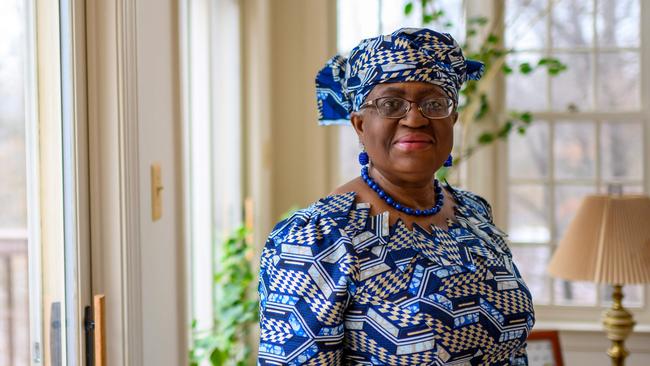
AFP
4.45am: Jaguar car brand to go fully electric from 2025
Jaguar, the Indian-owned luxury car brand, will produce only electric vehicles from 2025 and restructure its UK non-manufacturing operations, the company announced.
“By the middle of the decade, Jaguar will have undergone a renaissance to emerge as a pure electric luxury brand,” said a statement from Jaguar Land Rover, which intends to become a net zero carbon company by 2039.
JLR said it “will substantially reduce and rationalise its non-manufacturing infrastructure in the UK”.
It did not say whether this meant job cuts were on the horizon. JLR will meanwhile invest £2.5 billion ($US3.5 billion, 2.9 billion euros) annually under its ‘Reimagine’ plan, which sees the first all-electric Land Rover model in 2024.
“At the heart of its Reimagine plan will be the electrification of both Land Rover and Jaguar brands on separate architectures with two clear, unique personalities,” the statement said.
AFP
4.40am: Vivendi plans Universal Music spin-off
Investors flocked into the French media conglomerate Vivendi after it unveiled plans to spin off the lucrative Universal Music Group, a move long sought by analysts as well as its own top shareholders.
Vivendi owns 80 per cent of UMG, whose artists and catalogue range from the Beatles to Lady Gaga, after recently selling 20 per cent to China’s Tencent group.
In December, Universal shocked many in the industry by announcing a deal to secure the rights to Bob Dylan’s entire back catalogue of songs, reportedly for more than $US300 million.
On Saturday, the company said it would study the distribution of 60 per cent of UMG to Vivendi shareholders in order to reduce what it called a “conglomerate discount.” “Vivendi’s leading institutional shareholders have been pressing for a number of years for a split or the distribution of Universal Music Group,” it said.
Vivendi said UMG, which would be listed on the Amsterdam stock market, could be worth at least 30 billion euros ($US36.4 billion).
The deal, set to be voted on at a shareholder meeting in March, sent Vivendi’s stock rocketing 18 per cent higher to 30.82 euros in Paris.
The company’s other assets range from movies and TV production to publishing and advertising.
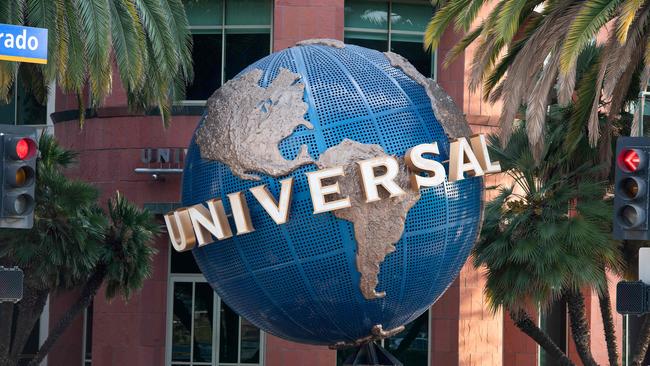
AFP



To join the conversation, please log in. Don't have an account? Register
Join the conversation, you are commenting as Logout